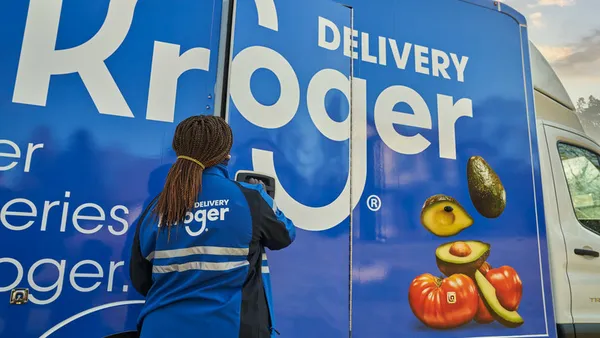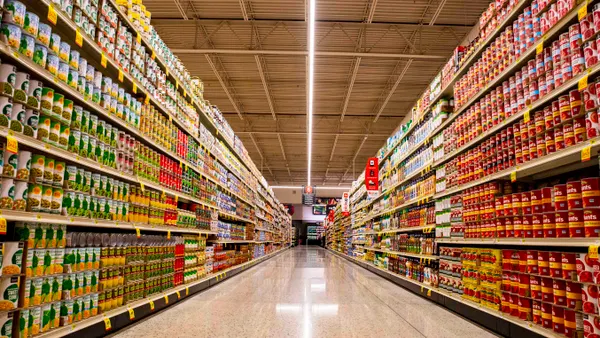With an average store size of around 200,000 square feet, Meijer has made its name in retail by thinking big. But in order to keep growing, it’s going to try shrinking down — way down.
Today marks the opening of the first Bridge Street Market, Meijer’s 37,000-square-foot grocery store located in downtown Grand Rapids, Michigan, mere miles from the company’s headquarters. The store features a variety of fresh foods, a bakery, full-service meat and seafood counters, a coffee shop and 2,000 grocery items ranging from Meijer store brands to locally sourced options.
From a design perspective, Meijer has traded sprawling warehouses for the practical-meets-stylish sensibility of urban retailing. The location features 22-foot-high ceilings along with garage-style doors that open out onto the sidewalk. Other retail stores and new apartment complexes sit nearby.
"The retail industry is ever changing, and as a result, Meijer continues to evaluate and offer solutions to address the many ways its customers shop," Christina Fecher, a spokeswoman for Meijer, told Food Dive in an email. "Opening a small format store that focuses on grocery in the heart of the city neighborhood was the next evolution."
Research shows that millennial consumers have flocked to large cities as well as mid-sized ones like Grand Rapids over the past decade. The trend has flagged a bit as older millennials move out to the suburbs, but reports note that Generation Z shoppers are picking up the slack.
So even though Bridge Street Market may have just opened its doors, Meijer is planning to build more small urban stores. Next up is a 42,000-square-foot Detroit store, which will open next year as part of a $60 million mixed-use development in the heart of downtown.
During a presentation at the International Council of Shopping Centers’ annual conference in March, Mike Kinstle, Meijer’s vice president of real estate, said a third store at a yet-to-be-disclosed location will begin construction this year, and that three additional locations are under development. The company should have these six small-format stores open by 2020 or 2021, he noted.
"It's a proof of concept so we'll get a few open and see how they do," Kinstle said at the time. "That will determine how aggressively we want to open future ones after that."
Fecher declined to confirm expansion plans beyond the Detroit location, including whether the additional stores will be branded under the Bridge Street Market name. "We continue to evaluate sites for similar small format stores," she told Food Dive.
'Not an optional move'
In addition to offering more consumers per square mile, urban markets tend to be less saturated with grocery stores when compared to the suburbs, said Diana Sheehan, director of retail insights with Kantar Retail. However, high rents and lack of availability are significant hurdles.
Building smaller stores also allows retailers like Meijer to capture the quick in-and-out shopping trips that consumers increasingly favor, she said. According to Nielsen data, 70% of grocery shopping visits are so-called quick trips. That percentage is expected to increase, according to the firm.
"This is not an optional move for Meijer," Sheehan told Food Dive. "This is a mandatory move as the shopper landscape changes. We have a demographic that is moving to urban areas, where the giant Meijer supercenter does not work."
Meijer isn't the only retailer that's feeling the pressure to slim down. Target is opening small stores across the country that are between 20,000 and 30,000 square feet and feature an array of fresh and prepared foods. By the end of next year, the company plans to have 130 of these locations up and running in cities like New York, Miami and Seattle.
Whole Foods, meanwhile, continues to open its 365 stores more than a year after it was acquired by Amazon, with its 10th location opening in Houston last week. Even regional grocers like Massachusetts’ Roche Bros and Raley’s in California are building small urban formats. Next year Roche, which operates 18 Roche Bros stores and two Sudbury Farms locations in the Boston area, will open its fourth Brothers Marketplace store — a 19,000- square-foot location in Cambridge.
"This is not an optional move for Meijer. This is a mandatory move as the shopper landscape changes. We have a demographic that is moving to urban areas, where the giant Meijer supercenter does not work."

Diana Sheehan
Director of retail insights, Kantar Retail
But opening smaller stores has proven tricky for retailers that aren't used to running them. Walmart Express stores launched in 2011 and grew to more than 100 locations before the company shut them all down two years ago. Ahold Delhaize also couldn't drum up significant interest among city-dwellers with its Bfresh concept, which folded last year.
Meijer itself has tried and failed with a smaller concept. Two Meijer Marketplace stores opened in the Chicago area back in 2011. But at 90,000 square feet, the locations were basically scaled-down versions of its supercenter format, Sheehan said, and didn't offer a compelling proposition for consumers. Meijer quietly closed down its Marketplace stores last year.
Asked what the company learned from this venture and if it believes Bridge Street Market will succeed, Fecher replied that Bridge Street is "an entirely new concept" that seeks to provide a "unique shopping experience" for customers.
Bridge Street Market is no Marketplace, but that fact alone doesn't guarantee success. In addition to the rigors of urban retailing, competition from Target, Whole Foods, Trader Joe’s and a red-hot Aldi will threaten expansion plans.
Sheehan says she’s upbeat on Bridge Street Market’s chances. She pointed to Meijer’s investment in Fresh Thyme Farmers Market, the Midwestern natural and organic chain founded in 2012 — a deal that may have helped Meijer learn more about fresh food marketing and running smaller stores.
"I don’t think they would be moving forward with multiple stores if they weren't confident they had what they needed in place," Sheehan said.
Bridge Street Market could serve as a test lab for products and concepts that could eventually make their way into Meijer stores. The supercenter retailer has increased its selection of fresh produce and prepared foods in recent years, including many locally sourced options. Fecher said the Bridge Street Market and Meijer buyers worked closely together to develop the store's assortment.
But the true test of success for Bridge Street Market, according to Sheehan, will be whether it can bring in new customers.
"If they’re opening these new stores and simply getting their existing base to shop, that’s not going to help them,” she said. “They have to attract new shoppers."











